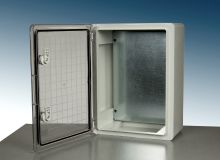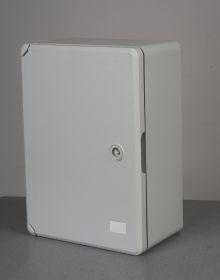
Counting the costs of poor quality
In any machine or system, some components are more important than others. However, sometimes the importance of a particular part is underappreciated; a typical example being an electrical enclosure, where it is usually a false economy to go for the poor quality option.
It is tempting to think of enclosures as simple boxes that, in the grand scheme of things, do not do much. But that is to completely misunderstand their purpose. The role of any electrical enclosure is to protect its contents – electrical equipment – which tends to be both a bit delicate and absolutely vital to the performance of the equipment!
Danger to electrical equipment may be in the form of occasional blows, or from the continuous presence of a harsh environment, but either way, if the electrical components get damaged, the equipment will have to be stopped. This will inevitably lead to lost production for the user and lost reputation for the system installer/builder, either of which can be extremely expensive. As a result, a cheap enclosure may prove to be more of a liability than an asset.
Conventionally, enclosures are made of pressed steel, but recent years have seen the growing emergence of polycarbonate as a highly appealing alternative with many attractive properties. For instance, DE Controls, the manufacturing arm of Hylec-APL, has developed a range of hinged-door enclosures that offer similar degrees of impact resistance to metal enclosures of similar sizes. Their advantages include lower unit costs and quicker installation; in use, they do not dent on impact, nor do they corrode in the presence of moisture or harsh chemicals. For outdoor applications, their resistance to the elements is excellent.
Polycarbonate enclosures are suitable as a direct replacement for metal units in almost all applications. To aid their adoption and installation some polycarbonate units are supplied with mounting brackets and a fitted galvanised steel backplate as standard. Polycarbonate enclosures are now the preferred choice in many applications, including in the industrial arena where impact damage is possible, in outdoor installations exposed to the weather and in public areas where they appear more attractive and modern than their metal counterparts.
Hinged-door enclosures that are fitted with locks and seals as standard are extremely secure and reliable, even when installed outside, while the external mounting brackets can be designed to make installation simple without compromising the IP65 rating against dust and moisture ingress. High-quality seals and hinges ensure that their performance won't deteriorate over time.
There are many types of polycarbonate, each with its own unique set of properties. For instance, ABS (acrylonitrile butadiene styrene) is flame retardant and when used with wall thicknesses up to 3.5mm, provides impact resistance of IK08 (protection against impacts with an energy up to 5 Joules). Since ABS is non-corrosive, the enclosures are also able to offer protection from continual exposure to external conditions, even in dockside and marine applications.
The hinged-door enclosures are available in a selection of eight sizes and can be specified with a solid grey door or a transparent, polycarbonate one, which is popular in applications where a meter has to be read or other indicators checked. The standard locks provided on the enclosures are quarter turn and operated by a triangular key similar to those used for utilities and gas meter enclosures.
Latest News
-
02/01/2025
BCL Enclosures joins Hylec -
27/09/2024
Hylec Showing at EDS 2024 We are exhibiting at EDS... -
30/01/2024
Exciting New Appointments for Hylec Hylec Kickstarts... -
11/01/2024
Hylec Go Kart Grand Prix The line-up for the first... -
01/12/2023
Hylec Closing dates for Christmas Hylec-APL will be closed from... -
01/02/2023
Hylec introduces new, improved Debox SL Hylec introduces the...
01933 234400



